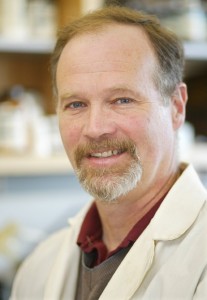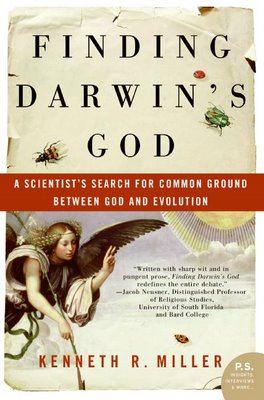(As we approach the debate, Geek Goes Rogue will continue to post interviews and editorials. In this particular interview, a man we’ve long admired, Dr. Kenneth Miller, Professor of Biology at Brown University, author and committed Catholic. Along with Francis Collins, he’s been on the forefront of teaching that you can be Christian and accept evolution. Here, he gives a short interview on all the issues that the upcoming debate brings up and what it will mean to the debate . And, hey, he’s been on the Colbert Report so, he really can’t get much cooler.)
Why do you think the issue of evolution versus creationism still stirs so much controversy?
There are several reasons for this. The first is that evolution concerns where we came from, and therefore who and what we are. It speaks to our self-image and how we should regard ourselves in the world of life. This is actually the principal subject of a book I am working on right now.
Religious opposition to evolution is related to this first reason, but it is particularly intense for many people. For those who fail to understand the allegorical nature of ancient scriptures, the modern understanding of earth’s natural history is a direct challenge to the authority of those scriptures. As a result, many religious communities have been brought up with the belief that to accept the scientific evidence for evolution is to put one’s immortal soul at risk. Given that fear, it has become all too easy for many religious groups to see science itself as their enemy and to reject reason itself.
Finally, the current political climate in America, unfortunately, has become one in which science itself has become politicized. This makes it all too easy for many people to see evolution as a liberal or left-wing political opinion, rather than the result of scientific inquiry.
 Why do so many American oppose the teaching of evolution and how can that problem be solved?
Why do so many American oppose the teaching of evolution and how can that problem be solved?
I’ve already addressed that in my first answer, but along those lines it’s worth noting that in the last two presidential election campaigns several candidates in the primary elections openly declared that they rejected evolution. While I have no doubt that they were sincere in their rejection, it’s cleo clear that they felt that for their political constituencies, this was a popular view that might help them win votes. That’s very disappointing.
I’m an eternal optimist, and I think that the solution to this is clear. Better science education, formal and informal, is the solution. The most recent Pew survey showed that acceptance of evolution is strongest among the young, which tells me that the efforts we have made in the past 20 years to improve science education in our schools are beginning to pay off. We need more of that, and we need to develop a genuine passion for science as a culture.
How does your own Catholicism help your scientific pursuits? Do they help or hinder them?
Well, my faith certainly doesn’t give me a short cut to doing science, if that’s what you mean. Thomas Aquinas noted that faith and reason are both gifts from God, and science requires both. All scientists apply reason to drive their use of the scientific method, and likewise all scientists have a faith that the universe is rational and intelligible. I feel that my own religious faith justifies the pursuit of rational science, and gives me a reason to regard the scientific enterprise as one of our highest callings as a species.
Do you think the upcoming Ham/Nye debate will help or hurt the ongoing conversation about Science and Faith?
I doubt it will help very much. Ken Ham has devoted millions of dollars at his Creation Museum into misleading his visitors as to the history of life on earth, and he is very practiced at this deception. As much as I admire Bill Nye, unless he has carefully studied each of the misleading arguments that creationists like Ham put forward to argue against evolution, he’s going to be at a disadvantage. It’s important to remember as well that Ham has already won enormous publicity just from the scheduling of such a debate, and all he has to do is to look like his ideas might be a “reasonable” alternative to evolution to achieve his goals. Mr. Nye’s professional training is in engineering and the physical sciences, not biology. Nonetheless, I am sure that Ham will pretend that he is a spokesman for the state of the art in the biological sciences, and if Ham is able to baffle him with a handful of scientific-sounding arguments based in biology, Ham will be able to declare victory.
What can Christians who are convinced of God’s use of evolution do to help encourage positive conversation?
I think the most basic point we can make is that science itself grew out of the western Christian tradition. The great scholars of our faith, including Augustine and Aquinas, were clear about the need for faith to be rational and to incorporate, not resist, the findings of what we call science today. Christianity subverts its own heritage by placing itself in opposition to science, and we should regard scientific knowledge not as a threat, but as a gift that plays an important role in bringing us closer to God.











